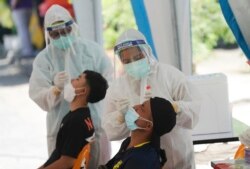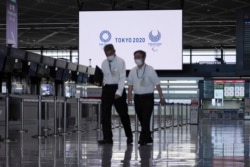Recent media reports in the United Kingdom have noted the emergence of a “Thai variant” of SARS-CoV-2, the coronavirus that causes COVID-19.
Those reports were based on a May 27 report by Public Health England (PHE), an executive agency sponsored by the U.K. Department of Health and Social Care.
The PHE report notes that C.36.3 — the SARS-CoV-2 mutation at issue — was designated a Variant Under Investigation on May 24 “on the basis of the mutation profile and increased importation from a widening international area.”
Approximately 109 cases had been detected in the U.K. at the time of the report’s publication.
Trouble is, the variant didn’t originate in Thailand, as some news reports suggested. That’s why the Thai prime minister’s P.R. office took to Twitter.
“The Director-General of the Department of Medical Sciences clarified that there has been some misleading information in the media on the Thai #COVID19 variant found in the UK,” it tweeted.
The department continued:
"According to the report from the Public Health England, the C.36.3 variant was detected in Thailand. Nonetheless, Thailand's Ministry of Public Health made it clear that the variant had actually been found in a person who traveled from Egypt while staying in the state quarantine."
That statement is true.
The director of Thailand’s Disease Control Department, Dr. Opart Karnkawinpong, explained the first known host of the C.36.3 variant was an Egyptian man who had traveled to Hong Kong and then Bangkok on January 25, according to Thai PBS, a public broadcasting service in Thailand.
After testing positive for COVID-19, the man was hospitalized on January 29. Karnkawinpong said that no one in Thailand was reported to have been infected with the C.36.3 variant, and it should therefore be viewed as “imported.”
That view is consistent with the British PHE report, which noted that the C.36.3 variant was “first detected in sequence from Thailand ex Egypt.”
What’s it all mean? Media reports labeling the variant solely as “Thai” were misleading. And the confusion underscores the dangers of labeling virus variants by geography, something the World Health Organization and experts want to correct.
It should be noted that some British media reports did state that the variant “was first detected in Thailand in people who had travelled from Egypt,” as reported by Yahoo News UK, The Mirror, The Independent and others. Yet, some, like The Independent, went for a clickbait headline, labeling the newly detected mutation a “Thai variant.”
The Independent further used misleading language, saying the "new mutant strain … first emerged in Thailand." "Emerged" implies place of origin, and that is unproved.
Researchers in the U.K. have developed a so-called Pango Network, which names versions of SARS-CoV-2 (such as B.1.1.7 and P.1).
However, that naming system has not been universally adopted. Thai media also have regularly referred to other variants of SARS-CoV-2 by their perceived geographical origins.
Katie Baca, a historian of science and medicine at Harvard University, and Susana Bejar, an internal medicine physician in New York City, have warned against "naming pathogens or diseases as if they have nationalities.”
For example, B.1.1.7, is commonly referred to as the “U.K. variant” of SARS-CoV-2. The strain was reported as a “variant of concern” on December 14, 2020.
But Baca and Bejar say that just because the U.K. first detected the B.1.1.7 variant, that “doesn’t mean the variant originated there.” They cite a BBC report that B.1.1.7 may have first been detected in the U.K. thanks to the country’s robust genomic surveillance system.
Other SARS-CoV-2 strains widely referred to by their supposed place of origin include the B.1.617 strain, first detected in India, and the B.1.351 variant, first detected in South Africa. A variant recently discovered in Vietnam that is believed to be a hybrid of the B.1.1.7 and B.1.617 strains is not being referred to as the Vietnam variant.
Some Thai public health officials say the naming conventions around another variant — P.1 — are analogous to those of C.36.3.
P.1 was first detected in four travelers from Brazil tested at Haneda Airport outside Tokyo, Japan, in January.
“If the origin [of C.36.3] is from Egypt then it should not be called a Thai variant,” the Thai Enquirer, an English language news website, quoted Supakit Sirilak, Chief of Thailand’s Department of Medical Sciences, as saying. “This is similar to Japan when they found the Brazilian variant. They reported it as the Brazilian strain. Therefore this should be called the Egyptian variant.”
The Thai government has been blamed for a failed vaccine rollout and “broken pandemic response” amid a recent surge in COVID-19 infections. But the country is not alone in trying to avoid being cast as a virus originator.
India's information technology (IT) ministry has also asked social media firms to scrub all references to an “Indian variant” of SARS-CoV-2 from their platforms.
“This is completely FALSE. There is no such variant of Covid-19 scientifically cited as such by the World Health Organization (WHO). WHO has not associated the term 'Indian Variant' with the B.1.617 variant of the coronavirus in any of its reports,” Reuters quoted the ministry as stating in a letter to social media firms.
Virus-blaming is setting off international alarms. A study published in the American Journal of Public Health cited a warning from United Nations Secretary-General António Guterres, who cautioned that “the pandemic continues to unleash a tsunami of hate and xenophobia, scapegoating and scare-mongering.”
According to the study, the WHO has recommended “avoiding terms that connect diseases to countries or specific people … to mitigate this discrimination.”
In earlier guidelines, the WHO said disease names should “consist of generic descriptive terms” related to symptoms,” as well as “who it affects, its severity or seasonality” and the pathogen which causes the disease, if known.
The WHO said disease names should not include geographic locations, including cities, countries, regions, continents; people’s names; species/class of animal or food; cultural, population, industry or occupational references; or terms that incite undue fear.
On May 31, the WHO announced what it called “simple, easy-to-say and remember” labels for SARS-CoV-2 variants of interest and concern.
Those labels will employ letters from the Greek alphabet.








